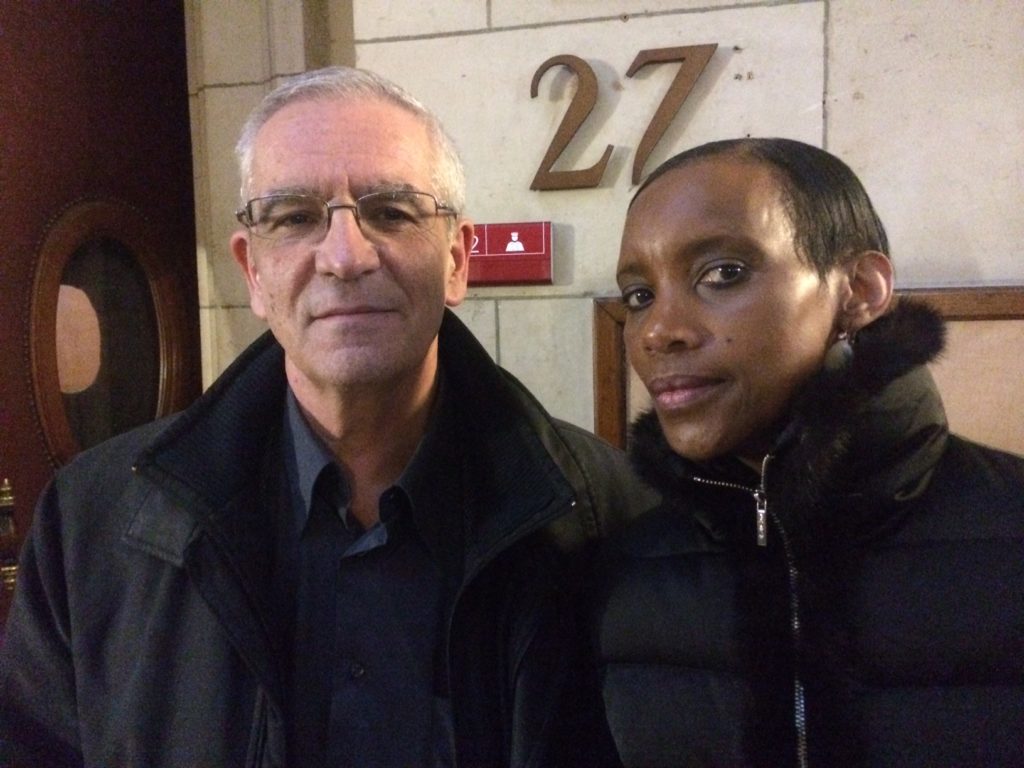
Alain Gauthier, President of the The French Collective of Civil Parties for Rwanda (CPCR), speaks to SURF about the historical importance of the first trial of a genocide suspect living on French soil in February 2014 – that of Pascal Simbikangwa. Since then, two more genocide suspects have been arrested by French authorities (Charles Twagira and Claude Muhayimana), and many more trials could take place.
Gauthier says: “Arrested in Mayotte, Pascal Simbikangwa was targeted by a complaint from the CPCR in February 2009. This proved to be of great historical significance. It is the first time a French court has convicted a genocide suspect. It is also important to note the high level of debate and quality of the proceedings overseen by the President of the Assize Court, Olivier Leurent.
The civil parties dedicate this court case to the innocent victims of the Rwandan genocide against the Tutsi, especially as they remain anonymous. Anonymity is a recurrent situation when a genocide organiser is tried before a court, as the International Criminal Tribunal for Rwanda (ICTR) has often shown. The conviction of Pascal Simbikangwa, sentenced to 25 years of imprisonment for genocide and crimes against humanity, pays tribute and honours all those unknown souls who were killed. It also honours survivors, who had lost faith in the French justice system, and in that of other nations, who have repeatedly failed to trial or extradite genocide suspects.
Unfortunately, in this case, it was not possible to find the families of victims, and therefore there can be no question of reparations in the strict sense of the term. In this context, the meaning of reparation is to recognise, the world over, that genocide took place: the perpetrators are identified and condemned and this alone is justice and gives great comfort.
The CPCR considers this trial to be the first of many in a long series, insofar as nearly 25 complaints have been filed at the office of the investigative Judge of Paris, most of them at the initiative of the CPCR. As of January 2012, the French government created an ‘Office of Investigation into crimes against humanity and crimes of war’ and equipped its justice system to pursue suspects. Several of them are now under investigation, by three judges who work full-time, assisted by a significant number of police officers. Crime scenes are regularly visited in Rwanda and members of the investigative team, either for the prosecution or for the defence, participate. It is a clear sign that justice is happening.
In the coming months we will focus on the fate of two Rwandan genocide suspects who are being held in Parisian prisons; Octavien Ngenzi, also arrested in Mayotte, and Tito Barahira. Both are suspected of genocide crimes in the small town of Kabarondo in eastern Rwanda, and both are former mayors of the town – it is possible that they will be jointly trialled as they committed crimes in the same place. In these cases, unlike the Simbikangwa trial, we will engage survivors in the proceedings: victims will no longer be anonymous.
Of course French justice still has a long way to go. We hope that other long overdue cases should soon be making the headlines. Two complaints initiated in 1995, which failed to progress, could see the light if judges decide to pursue them. These concern the priest Wenceslas Munyeshyaka and Sosthenes Munyemana, a doctor nicknamed the “butcher of Tumba ». Two other doctors are also targeted by our indictments – Eugène Rwamucyo and André Twagira. Military personnel are also being pursued, including Laurent Serubuga, former Deputy Chief of Staff of the Rwandan army, and Marcel Bivugabagabo. Not least is the most famous of ‘illegal immigrants’ in France, Agathe Habyarimana, the widow of the former President. For a complete list see CPCR.
In light of the large number of genocide suspects who fled Rwanda in July 1994 and the closure of ICTR this year, national authorities are duty-bound to prosecute all those who have until now escaped justice. The crime of genocide never expires, but the longer we wait, the more it favours the perpetrators. It is therefore urgent that the justice systems of all countries that harbour genocide perpetrators, and France in particular, continue to work tirelessly against impunity.
The CPCR, with its limited resources, will continue to ensure justice for the innocent victims of the Rwandan genocide against the Tutsi in 1994. We believe that only justice can restore the dignity of victims. This is our determined mission, that Rwanda knows peace “without hatred or revenge”, in the words of Simon Wiesenthal.”
Alain Gauthier, President of the CPCR


